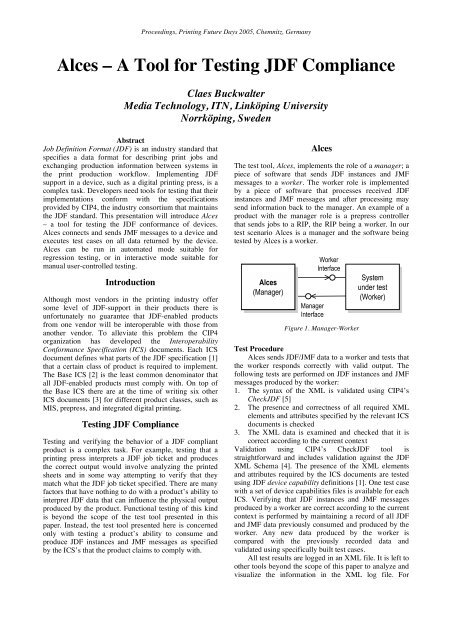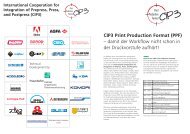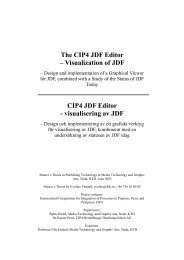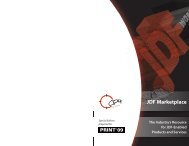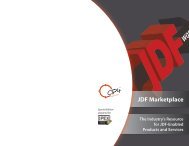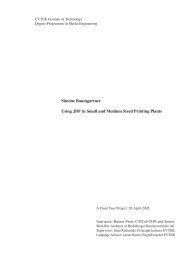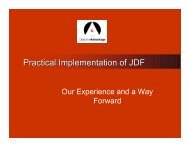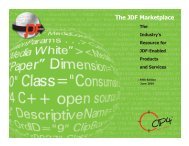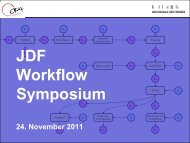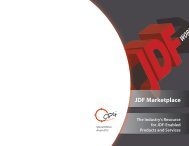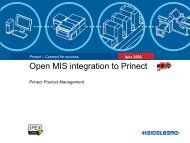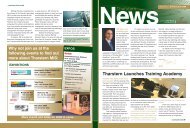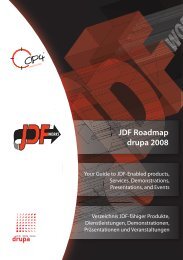Alces – A Tool for Testing JDF Compliance - CIP4
Alces – A Tool for Testing JDF Compliance - CIP4
Alces – A Tool for Testing JDF Compliance - CIP4
- TAGS
- alces
- compliance
- www.cip4.org
You also want an ePaper? Increase the reach of your titles
YUMPU automatically turns print PDFs into web optimized ePapers that Google loves.
Proceedings, Printing Future Days 2005, Chemnitz, Germany<br />
<strong>Alces</strong> <strong>–</strong> A <strong>Tool</strong> <strong>for</strong> <strong>Testing</strong> <strong>JDF</strong> <strong>Compliance</strong><br />
Claes Buckwalter<br />
Media Technology, ITN, Linköping University<br />
Norrköping, Sweden<br />
Abstract<br />
Job Definition Format (<strong>JDF</strong>) is an industry standard that<br />
specifies a data <strong>for</strong>mat <strong>for</strong> describing print jobs and<br />
exchanging production in<strong>for</strong>mation between systems in<br />
the print production workflow. Implementing <strong>JDF</strong><br />
support in a device, such as a digital printing press, is a<br />
complex task. Developers need tools <strong>for</strong> testing that their<br />
implementations con<strong>for</strong>m with the specifications<br />
provided by <strong>CIP4</strong>, the industry consortium that maintains<br />
the <strong>JDF</strong> standard. This presentation will introduce <strong>Alces</strong><br />
<strong>–</strong> a tool <strong>for</strong> testing the <strong>JDF</strong> con<strong>for</strong>mance of devices.<br />
<strong>Alces</strong> connects and sends JMF messages to a device and<br />
executes test cases on all data returned by the device.<br />
<strong>Alces</strong> can be run in automated mode suitable <strong>for</strong><br />
regression testing, or in interactive mode suitable <strong>for</strong><br />
manual user-controlled testing.<br />
Introduction<br />
Although most vendors in the printing industry offer<br />
some level of <strong>JDF</strong>-support in their products there is<br />
un<strong>for</strong>tunately no guarantee that <strong>JDF</strong>-enabled products<br />
from one vendor will be interoperable with those from<br />
another vendor. To alleviate this problem the <strong>CIP4</strong><br />
organization has developed the Interoperability<br />
Con<strong>for</strong>mance Specification (ICS) documents. Each ICS<br />
document defines what parts of the <strong>JDF</strong> specification [1]<br />
that a certain class of product is required to implement.<br />
The Base ICS [2] is the least common denominator that<br />
all <strong>JDF</strong>-enabled products must comply with. On top of<br />
the Base ICS there are at the time of writing six other<br />
ICS documents [3] <strong>for</strong> different product classes, such as<br />
MIS, prepress, and integrated digital printing.<br />
<strong>Testing</strong> <strong>JDF</strong> <strong>Compliance</strong><br />
<strong>Testing</strong> and verifying the behavior of a <strong>JDF</strong> compliant<br />
product is a complex task. For example, testing that a<br />
printing press interprets a <strong>JDF</strong> job ticket and produces<br />
the correct output would involve analyzing the printed<br />
sheets and in some way attempting to verify that they<br />
match what the <strong>JDF</strong> job ticket specified. There are many<br />
factors that have nothing to do with a product’s ability to<br />
interpret <strong>JDF</strong> data that can influence the physical output<br />
produced by the product. Functional testing of this kind<br />
is beyond the scope of the test tool presented in this<br />
paper. Instead, the test tool presented here is concerned<br />
only with testing a product’s ability to consume and<br />
produce <strong>JDF</strong> instances and JMF messages as specified<br />
by the ICS’s that the product claims to comply with.<br />
<strong>Alces</strong><br />
The test tool, <strong>Alces</strong>, implements the role of a manager; a<br />
piece of software that sends <strong>JDF</strong> instances and JMF<br />
messages to a worker. The worker role is implemented<br />
by a piece of software that processes received <strong>JDF</strong><br />
instances and JMF messages and after processing may<br />
send in<strong>for</strong>mation back to the manager. An example of a<br />
product with the manager role is a prepress controller<br />
that sends jobs to a RIP, the RIP being a worker. In our<br />
test scenario <strong>Alces</strong> is a manager and the software being<br />
tested by <strong>Alces</strong> is a worker.<br />
<strong>Alces</strong> <strong>Alces</strong><br />
(Manager)<br />
Manager<br />
Interface<br />
Worker<br />
Interface<br />
Figure 1. Manager-Worker<br />
System System<br />
under under test test<br />
(Worker) (Worker)<br />
Test Procedure<br />
<strong>Alces</strong> sends <strong>JDF</strong>/JMF data to a worker and tests that<br />
the worker responds correctly with valid output. The<br />
following tests are per<strong>for</strong>med on <strong>JDF</strong> instances and JMF<br />
messages produced by the worker:<br />
1. The syntax of the XML is validated using <strong>CIP4</strong>’s<br />
Check<strong>JDF</strong> [5]<br />
2. The presence and correctness of all required XML<br />
elements and attributes specified by the relevant ICS<br />
documents is checked<br />
3. The XML data is examined and checked that it is<br />
correct according to the current context<br />
Validation using <strong>CIP4</strong>’s Check<strong>JDF</strong> tool is<br />
straight<strong>for</strong>ward and includes validation against the <strong>JDF</strong><br />
XML Schema [4]. The presence of the XML elements<br />
and attributes required by the ICS documents are tested<br />
using <strong>JDF</strong> device capability definitions [1]. One test case<br />
with a set of device capabilities files is available <strong>for</strong> each<br />
ICS. Verifying that <strong>JDF</strong> instances and JMF messages<br />
produced by a worker are correct according to the current<br />
context is per<strong>for</strong>med by maintaining a record of all <strong>JDF</strong><br />
and JMF data previously consumed and produced by the<br />
worker. Any new data produced by the worker is<br />
compared with the previously recorded data and<br />
validated using specifically built test cases.<br />
All test results are logged in an XML file. It is left to<br />
other tools beyond the scope of this paper to analyze and<br />
visualize the in<strong>for</strong>mation in the XML log file. For
example, the XML log file could be trans<strong>for</strong>med using<br />
XSLT to an XHTML document <strong>for</strong> viewing in a web<br />
browser.<br />
Architecture<br />
<strong>Alces</strong> is implemented as a Java application that<br />
consists of three main modules, as shown in Figure 1.<br />
The client module sends <strong>JDF</strong>/JMF data to the worker<br />
under test; the server module receives <strong>JDF</strong>/JMF data<br />
from the worker; and the test module coordinates the test<br />
data sent to the worker and validates all data produced by<br />
the worker. The outgoing test data used to probe the<br />
worker consists of a set of manually written <strong>JDF</strong> and<br />
JMF files; all validated using <strong>CIP4</strong>’s Check<strong>JDF</strong> tool [5].<br />
These files can easily be modified or replaced if<br />
necessary. The test cases are dynamically loaded at<br />
startup of <strong>Alces</strong> and are configured using configuration<br />
files. New ICS support can be added by creating a new<br />
test case.<br />
Test<br />
Results<br />
Log<br />
Test <strong>Tool</strong> (Manager)<br />
Test<br />
Module<br />
Test<br />
Cases<br />
<strong>JDF</strong>/JMF<br />
Test Files<br />
Client<br />
Module<br />
Server<br />
Module<br />
ICS Test<br />
Configs<br />
<strong>JDF</strong>/JMF<br />
<strong>JDF</strong>/JMF<br />
Figure 2. Architecture<br />
Future Work<br />
Software<br />
under test<br />
(Worker)<br />
<strong>Alces</strong> has so far been used <strong>for</strong> testing <strong>CIP4</strong>’s internal<br />
software tools but more extensive testing against third<br />
party products must be conducted in order to thoroughly<br />
evaluate <strong>Alces</strong>. Currently, there is only a test case <strong>for</strong> the<br />
Base ICS. Additional test cases <strong>for</strong> other ICS’s must be<br />
implemented <strong>for</strong> testing more than the minimal level of<br />
<strong>JDF</strong> functionality. Nonetheless, <strong>Alces</strong> is still useful since<br />
vendors will need to test their Base ICS implementations.<br />
The complete source code and up to date<br />
in<strong>for</strong>mation regarding the development of <strong>Alces</strong> is<br />
available at [6].<br />
Acknowledgements<br />
The author thanks Ola Stering and the members of<br />
<strong>CIP4</strong> <strong>for</strong> testing <strong>Alces</strong> and giving valuable feedback. A<br />
word of gratitude also goes to the author’s supervisor<br />
Professor Björn Kruse, ITN, Linköping University, <strong>for</strong><br />
his support and encouragement.<br />
References<br />
1. <strong>JDF</strong> Specification Version 1.2 [Online]. Available:<br />
http://www.cip4.org/documents/jdf_specifications/<strong>JDF</strong>1.2.<br />
pdf [2005, September 13]<br />
2. Base Interoperability Con<strong>for</strong>mance Specification (Base<br />
ICS) [Online]. Available:<br />
http://www.cip4.org/document_archive/documents/ICS-<br />
Base-1.0.pdf [2005, September 13]<br />
3. ICS Registry [Online]. Available:<br />
http://www.cip4.org/document_archive/ics.php [2005,<br />
September 13]<br />
4. XML Schema <strong>for</strong> <strong>JDF</strong> Version 1.2 [Online]. Available:<br />
http://www.cip4.org/Schema/<strong>JDF</strong>Schema_1_2/<strong>JDF</strong>.xsd<br />
[2005, September 13]<br />
5. <strong>JDF</strong> Open Source [Online]. Available:<br />
http://www.cip4.org/open_source/index.html [2005,<br />
September 13]<br />
6. <strong>Alces</strong> [Online]. Available: http://elk.itn.liu.se/alces [2005,<br />
September 13]<br />
Biography<br />
Claes Buckwalter has a Master’s degree in Media<br />
Technology and Engineering from Linköping University,<br />
Sweden, where he is currently a Ph.D. student. Claes’s<br />
Ph.D. studies focus on integration technologies and<br />
process automation in the graphic arts industry. Claes is<br />
also involved in the <strong>CIP4</strong> organization where he is<br />
chairman of the <strong>Tool</strong>s & Infrastructure working group.


